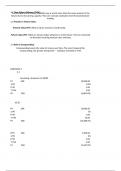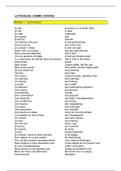AUTHORS AND THEIR WORKS WITH COMPLETE
SOLUTIONS 100%
Homer
Homeric or Heroic Period. The greatest of the ancient Greek epic poets and author of the Iliad and the
Odyssey, works that lie at the beginning of the Western literary canon.
Gorgias
Greek sophist from Sicily who turned his back on true philosophy; believed that all statements were
false and that everything was incomprehensible and unknowable
Aesop
Greek author of fables
Plato
Classical Greek (Athenian) philosopher and student of Socrates known for his work, The Republic,
which detailed a perfectly-governed society, and for his allegory of the cave.
Socrates
Classical Greek Athenian philosopher, Athenian philosopher (ca. 470-399 B.C.E.) who shifted the
emphasis of philosophical investigation from questions of natural science to ethics and human
behavior. His method of teaching through asking questions, as detailed in Plato's Dialogues, has
become incredibly influential.
Aristotle
Classical Greek Athenian philosopher who was a student of Plato and teacher of Alexander the Great.
Believed that knowledge ought to be based on observation of phenomena in material world, which
gave way to the Scientific Method.
Euripides
One of the three great tragedians of classical Athens who represented mythical heroes as ordinary
people in extraordinary circumstances. Works included Medea and The Trojan Women.
Sophocles
One of the three great tragedians of classical Athens who is known for his Theban plays, Oedipus Rex,
Oedipus at Colonus, and Antigone. His influence is seen in the addition of a third actor to the stage
and his complex development of characters.
Aeschylus
The first of the three great tragedians of ancient Greece. Known as the father of tragedy. Author of
works such as The Persians and The Oresteia trilogy.
Plautus
Roman playwright of the Old Latin Period. Wrote primarily comedies in a colloquial style.
Terence
, Freed slave who became one of the foremost writers of comedies in the Roman Republic. Most
famous quotation: "I am a human being, I consider nothing that is human alien to me." Primarily
adapted Greek comedies.
Ovid
Roman poet remembered for his influential verses on love and for his Metamorphoses, which is one
of the most important sources of classical mythology.
Horace
Roman lyric poet whose hexameter and iambic verses heavily influenced English poetry. Author of
Odes.
Virgil
Ancient Roman poet known for three great, early works of Latin literature, particularly the epic
Aeneid.
Saint Augustine
(354 - 430) Latin philosopher and one of the most important Christian theologians who believed that
the grace of Christ was indispensable to human freedom and who framed the concepts of original sin
and just war. Known for his work: City of God.
Saint Jerome
(347 - 420) Roman Christian priest known for his translation of the Bible into Latin.
Peter Abelard
(1079 - 1142) Medieval French scholastic philosopher, theologian and logician who decisively fixed the
scholastic manner of philosophizing and helped establish the ascendancy of Aristotle and the other
Greek philosophers in Western thought. Known for his affair with Heloise.
Geoffrey Chaucer
(1343 - 1400) English poet known as the father of English literature and known as the author of The
Canterbury Tales. Wrote in vernacular (Middle English), helping to establish its legitimacy.
William Langland
(1332 - 1386) Conjectured author of the 14th-century English allegorical poem Piers Plowman.
Boccaccio
(1313 - 1375) Italian author and poet known primarily for his work The Decameron. His writing is
notable for its realistic dialogue in a time of largely formulaic stories.
Petrarch
(1304 - 1374) Italian scholar and poet known as the Father of Humanism and a model for Italian and,
more generally, lyrical poetry largely because of his sonnets.
Dante Alighieri



